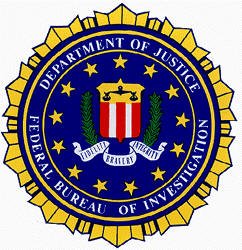 The FBI has yet to uncover the source of forged documents that lie at the heart of the CIA leak investigation.
The FBI has yet to uncover the source of forged documents that lie at the heart of the CIA leak investigation.The documents were the reason Washington sent Joe Wilson to Niger to investigate whether Iraq was attempting to buy uranium. Mr Wilson reported there was no truth to the idea.
But the White House treated it as fact in President Bush's 2003 State of the Union Speech. Mr Wilson went public about the error of the "16 words." And shortly after that, someone at the White House revealed, publicly, that Mr Wilson's wife, Valerie Plame, was a CIA agent.
Tht CIA didn't get their hands on the papers until months after Mr Wilson's trip. But they found that intel they'd gathered leading to his trip was "based on the forged documents and was thus itself unreliable."
The forged documents play into the mindset of the Bush administration's long standing view of Iraq. That view, the war, and the investigation are all woven together. Here's a short timeline:
- January 21, 2001: President Bush sworn in
- January-September, 2001: The New Yorker would report in it's October 27, 2003 issue that the Bush administration began to systematically change the way intelligence data was vetted. Kenneth Pollack, a former Iraq expert for the National Security Council, told the magazine: "They created stovepipes to get the information they wanted directly to the top leadership." The move makes it easier for intel a politician wants to see make its way up the ladder, while other intel that conflicts or contradicts it is buried
- January-September, 2001: The administration makes "regime change" a priority in Iraq. At the time, a coup by the Iraqi National Congress is seen as the best method
- September 11, 2001: Terror attacks kill more than 3,000 Americans in New York, Washington, and Pennsylvania
- September 12, 2001: During two meetings of the National Security Council, Defense Secretary Donald Rumsfeld suggests including Iraq in any response to the 9/11 attacks -- even though no evidence pointed to Iraq (from "10 days in September," byWashington Post reporter Bob Woodward)
- September, 13 2001: Deputy Defense Secretary Paul Wolfowitz -- at the daily Pentagon press briefing -- suggests the US will go after states that sponsor terrorism. In his series, "10 days in September," Washington Post reporter Bob Woodward says the statement took some in the administration by surprise, seeing it as an attempt to prod the administration into including Iraq in its first round of attacks
- October, 2001: The dates on the earliest CIA documents mentioning the Iraq-Niger connection -- but the report was sketchy and clearly marked as uncorroborated
- February 12, 2002: The Defense Intelligence Agency issues a report mentioning the connection. It repeats the information in the earlier CIA report
- February, 2002: Vice President Cheney reads the DIA report and asks the CIA for an analysis
- February, 2002: CIA's Counterproliferation Division -- where Valerie Plame is an undercover officer -- contacts her husband, Joe Wilson, to go to Niger (Mr Wilson had been posted to Niger early in his diplomatic career)
- February, 2002: Mr Wilson goes to Africa. He reported back there was no information to back up the claims
- August, 26, 2002: Vice President Cheney, speaking to a VFW Convention in Nashville, warned that Iraq would "fairly soon" have nuclear weapons
- October, 2002: The issue returns when an Italian journalist turned copies of the forged documents over to the CIA
- October-November, 2002: Citing Iraq's purported weapons of mass destruction (WMD), President Bush or senior members of his administration refer to the WMD threat from Iraq as: "significant," "real," "real and dangerous," "serious and growing," "of unique urgency," "unique and urgent," "grave," "much graver," "terrible," "immediate," and "imminent."
- January, 2003: President Bush included the "16 words" statement in his State of the Union speech -- saying there was a real attempt by Iraq to buy uranium from Niger
- January 29, 2003: Defense Secretary Donald Rumsfeld declares: "Iraq poses a serious and mounting threat to our country. His (Saddam's) regime has the design for a nuclear weapon, was working on several different methods of enriching uranium, and recently was discovered seeking significant quantities of uranium from Africa."
- March, 2003: The CIA determined the papers were forgeries
- March 20, 2003: The US and Coalition Allies invade Iraq.
- July 6, 2003: "What I Didn't Find in Africa," an op-ed piece by Mr Wilson appears in the New York Times. It's critical of the Bush administration's claim of Iraq's attempts to obtain uranium from Africa
- July, 2003: Vainity Fair quotes Deputy Defense Secretary on the administration's plan to sell the Iraq War to the American people: "For bureaucratic reasons we settled on one issue, weapons of mass destruction, because it was the one reason everyone could agree on."
- July, 2003: Someone at the White House leaks the identity of Valerie Plame to several journalists, mentioning she is a CIA agent and married to Joe Wilson.
- July 14, 2003: Columnist Robert Novak includes the Valerie Plame information in his syndicated column. The disclosure would launch Patrick Fitzgerald's investigation into the leak
- March 31, 2005: The Commission on the Intelligence Capabilities of the United States Regarding Weapons of Mass Destruction -- President Bush's commission set up to look into intel failures over the non-existent Iraqi WMD program -- called the US intel community "dead wrong" on WMDs going into the Iraq War.
No comments:
Post a Comment